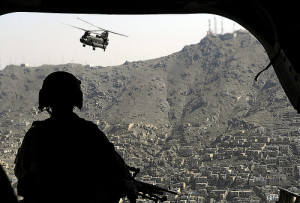
It is an exact description of this country’s true position in the Middle East and Central Asia. Without a fundamental, lasting peace in this region, there will never be stability on the southern borders of Russia.
The importance of Afghanistan for the modern international security system is explained by the fact that the situation in this country has for the last several decades been a source of threats and challenges both at the regional and global scale. The string of wars leading to the destruction of economic infrastructure in the country and the population’s poverty of the same level as in the Middle Ages had created conditions for a permanent socio-economic crisis which was exacerbated by the aggressive acts – disproportionate to the real situation – on the part of the USA and NATO, and that, in turn, created a breeding ground for terrorism, religious extremism and drug trafficking.
Modern Afghanistan has turned into a state where numerous contradictions of the contemporary world are concentrated in one place: the ideological, political, economic, social and religious contradictions giving rise to threats to international security and to the Russian Federation, in particular. The Afghan instability is spreading to the countries of Central Asia, whose political regimes are not yet capable to properly stand up to the Islamist radicals. If the ideology of Taliban advances up to the north, to the Central Asian states, the zone of political instability might spread not only to the Northern Caucasus but also to the other Islamic regions of Russia – Tatarstan and Bashkiria. Besides, these processes can affect the Islamic diaspora of the Urals, Siberia and the central regions of our country.
The failure of the USA and its NATO allies’ policy regarding the solution of the Afghanistan problem is caused by two main reasons: the desire of the West to implement its own vision of social relations in a completely different socium and the West’s misunderstanding of the processes that are taking place in the Islamic world. The government of Afghanistan guided by American political technologists sees a way out of the deadlock in holding negotiations with the Taliban in order to put an end to armed confrontation and move on to the integration of Taliban into the political system of the country. The Taliban has responded to that with its own condition that the negotiations are possible only after a complete withdrawal of the foreign troops from the country.
This has already happened before during the Soviet presence in Afghanistan, when the opposition declared that reconciliation was possible after the Soviet troops’ withdrawal from the country. But then a civil war began in Afghanistan, and the Taliban came to power. It is very likely that this is what is going to happen after the coalition forces leave the country.
To prevent this sort of development of events, it is necessary to ensure that the presence of the foreign troops in the country continues. And this leads to the need for counter-insurgency operations both in the territory of Afghanistan and in the tribal areas on the Afghan-Pakistan border. Meanwhile, some experts believe that there is no military solution to the Afghan problem either in the short or long term. The fact is that the political influence of the Taliban in Afghanistan is rather strong. According to different estimates, the level of the public support for the Taliban movement, Hekmatyar’s Islamic Party and other opponents to the current regime is about 80%.
The scattered resistance of field commanders has transformed into a nationwide struggle, in the course of which representatives of the most Afghan ethnic groups – Pashtuns, Tajiks, Uzbeks, Turkmens and Hazaras – are striving for new consolidation by opposing the foreign invaders and the incapable central government as the Afghan people as a whole.
The presence of the coalition forces enables, to some extent, to ensure a balance of forces and to maintain the manageability of the military and political situation in the country. And Western political technologists are going to use the time available to them to look for ways of the political settlement of the Afghan problem. Meanwhile, the policy of searching for and involving the so-called “moderate Taliban” in the government under the slogan of “national reconciliation” has proven to be of no avail. Cooperation with the “moderate Taliban” is not yielding the anticipated political dividends due to its scarcity and insignificant influence on the political processes in Afghan society.
The USA’s and Great Britain’s emissaries as well as Hamid Karzai, who is pursuing the policy of Washington in Afghanistan, have been unable to split the Taliban with a view to making it weaker and eliminating the remaining pockets of resistance separately. What is happening is the other way round. Extremists are expanding and strengthening their positions in a number of provinces, thus jeopardising the existence of the present political system in Afghanistan.
The main task of the US foreign policy in Afghanistan is to establish control over the transportation of energy resources from the Middle East to exert economic pressure on China. And the environment in which they implement their policy is “controlled chaos”, which is created through manipulating the conflict potential of the region.
(to be continued)
Vladimir Karyakin, Candidate of Military Sciences, senior research fellow at the Department of Defence Policy at the Russian Institute of Strategic Studies. The article was written exclusively for the online magazine New Eastern Outlook.
